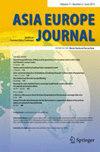Political informality, state transition and Belt and Road Initiative: the case of Turkey’s logistics sector
Abstract
Regional integration changes domestic decision-making structures, relations among social forces, and power distribution in different ways. China influences Turkey’s domestic dynamics through involvement in economic cooperation, geostrategic alliances, and factional alliances. Concurrent and conflicting decision-making processes and foreign policy informality shape Turkey’s engagement with China’s Belt and Road Initiative (BRI). This research conceptualizes political informality as an authoritarian governance tool within the legal boundaries but outside of bureaucratic rationality. Turkey’s attempts to be involved in the BRI have contributed to informalization as an authoritarian strategy of the ruling party (AKP). This research concerns a case study on the now Chinese-owned Kumport to demonstrate how informalization of state-business relations shapes Turkey’s transnational relations. The findings point out to the negative consequences of this informalization on the Chinese investments in Turkey’s logistics sector. The decrease in the power of the relatively Weberian bureaucracy of Turkey under the new presidential system led to the marginalization of Kumport in global shipping routes.

 求助内容:
求助内容: 应助结果提醒方式:
应助结果提醒方式:


